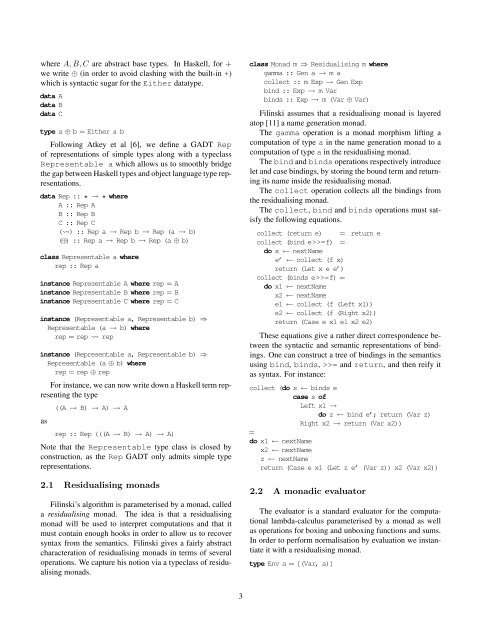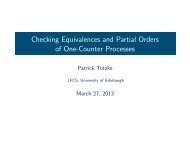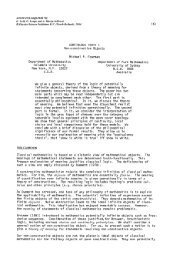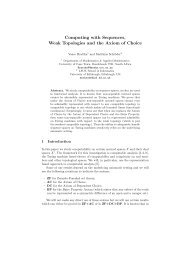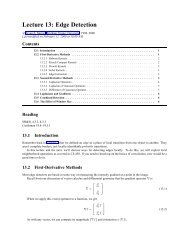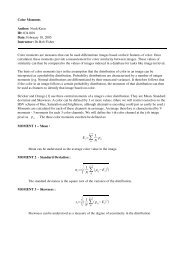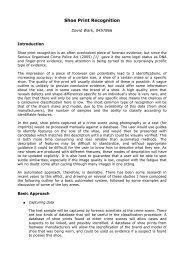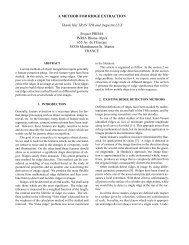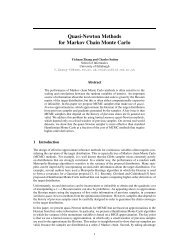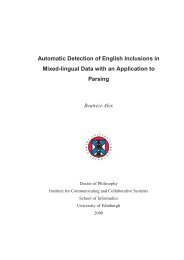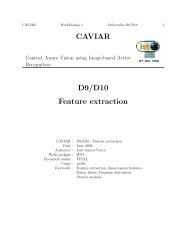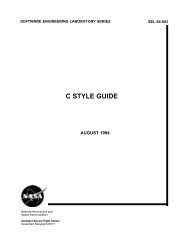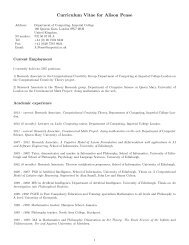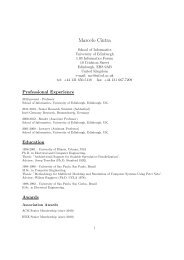Accumulating bindings - University of Edinburgh
Accumulating bindings - University of Edinburgh
Accumulating bindings - University of Edinburgh
Create successful ePaper yourself
Turn your PDF publications into a flip-book with our unique Google optimized e-Paper software.
where A, B, C are abstract base types. In Haskell, for +<br />
we write ⊕ (in order to avoid clashing with the built-in +)<br />
which is syntactic sugar for the Either datatype.<br />
data A<br />
data B<br />
data C<br />
type a ⊕ b = Either a b<br />
Following Atkey et al [6], we define a GADT Rep<br />
<strong>of</strong> representations <strong>of</strong> simple types along with a typeclass<br />
Representable a which allows us to smoothly bridge<br />
the gap between Haskell types and object language type representations.<br />
data Rep :: ⋆ → ⋆ where<br />
A :: Rep A<br />
B :: Rep B<br />
C :: Rep C<br />
() :: Rep a → Rep b → Rep (a → b)<br />
(⊕) :: Rep a → Rep b → Rep (a ⊕ b)<br />
class Representable a where<br />
rep :: Rep a<br />
instance Representable A where rep = A<br />
instance Representable B where rep = B<br />
instance Representable C where rep = C<br />
instance (Representable a, Representable b) ⇒<br />
Representable (a → b) where<br />
rep = rep rep<br />
instance (Representable a, Representable b) ⇒<br />
Representable (a ⊕ b) where<br />
rep = rep ⊕ rep<br />
For instance, we can now write down a Haskell term representing<br />
the type<br />
as<br />
((A → B) → A) → A<br />
rep :: Rep (((A → B) → A) → A)<br />
Note that the Representable type class is closed by<br />
construction, as the Rep GADT only admits simple type<br />
representations.<br />
2.1 Residualising monads<br />
Filinski’s algorithm is parameterised by a monad, called<br />
a residualising monad. The idea is that a residualising<br />
monad will be used to interpret computations and that it<br />
must contain enough hooks in order to allow us to recover<br />
syntax from the semantics. Filinski gives a fairly abstract<br />
characteration <strong>of</strong> residualising monads in terms <strong>of</strong> several<br />
operations. We capture his notion via a typeclass <strong>of</strong> residualising<br />
monads.<br />
class Monad m ⇒ Residualising m where<br />
gamma :: Gen a → m a<br />
collect :: m Exp → Gen Exp<br />
bind :: Exp → m Var<br />
binds :: Exp → m (Var ⊕ Var)<br />
Filinski assumes that a residualising monad is layered<br />
atop [11] a name generation monad.<br />
The gamma operation is a monad morphism lifting a<br />
computation <strong>of</strong> type a in the name generation monad to a<br />
computation <strong>of</strong> type a in the residualising monad.<br />
The bind and binds operations respectively introduce<br />
let and case <strong>bindings</strong>, by storing the bound term and returning<br />
its name inside the residualising monad.<br />
The collect operation collects all the <strong>bindings</strong> from<br />
the residualising monad.<br />
The collect, bind and binds operations must satisfy<br />
the following equations.<br />
collect (return e) = return e<br />
collect (bind e>>=f) =<br />
do x ← nextName<br />
e’ ← collect (f x)<br />
return (Let x e e’)<br />
collect (binds e>>=f) =<br />
do x1 ← nextName<br />
x2 ← nextName<br />
e1 ← collect (f (Left x1))<br />
e2 ← collect (f (Right x2))<br />
return (Case e x1 e1 x2 e2)<br />
These equations give a rather direct correspondence between<br />
the syntactic and semantic representations <strong>of</strong> <strong>bindings</strong>.<br />
One can construct a tree <strong>of</strong> <strong>bindings</strong> in the semantics<br />
using bind, binds, >>= and return, and then reify it<br />
as syntax. For instance:<br />
collect (do s ← binds e<br />
case s <strong>of</strong><br />
Left x1 →<br />
do z ← bind e’; return (Var z)<br />
Right x2 → return (Var x2))<br />
=<br />
do x1 ← nextName<br />
x2 ← nextName<br />
z ← nextName<br />
return (Case e x1 (Let z e’ (Var z)) x2 (Var x2))<br />
2.2 A monadic evaluator<br />
The evaluator is a standard evaluator for the computational<br />
lambda-calculus parameterised by a monad as well<br />
as operations for boxing and unboxing functions and sums.<br />
In order to perform normalisation by evaluation we instantiate<br />
it with a residualising monad.<br />
type Env a = [(Var, a)]<br />
3


